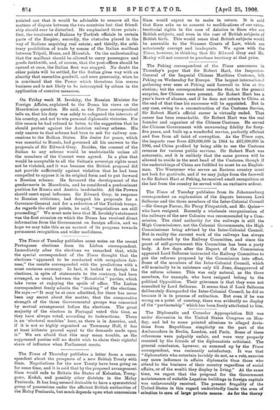On Friday week M. Isvolsky, the Russian Minister for Foreign
Affairs, explained to the Duma his views on the Macedonian question. He said, as the Times correspondent tells us, that his duty was solely to safeguard the interests of his country, and not to win personal diplomatic victories. For this reason he had refused to listen to the suggestion that he should protest against the Austrian railway scheme. His only answer to that scheme had been to ask for railway con- cessions to the Balkan States. His desire for peace, which was essential to Russia, bad governed all his answers to the proposals of Sir Edward Grey. Besides, the consent of the Sultan to any scheme would be unobtainable unless all the members of the Concert were agreed. In a plan that would be acceptable to all the Sultan's sovereign rights must not be violated, and it was because the British proposal did not provide sufficiently against violation that he had been compelled to oppose it in its original form and to put forward a Russian scheme. He favoured the development of the gendarmerie in Macedonia, and he considered a predominant position for Russia and Austria inadvisable. All the Powers should exert equal influence. Sir Edward Grey, in response to Russian criticisms, had dropped his proposals for a Governor-General and for a reduction of the Turkish troops. As regards the other points, he said, "negotiations are still proceeding." We must note here that M. Isvolsky's statement was the first occasion on which the Duma has received direct information from the Government on foreign affairs, and we hope we may take this as an earnest of its progress towards permanent recognition and wider usefulness.






















































 Previous page
Previous page